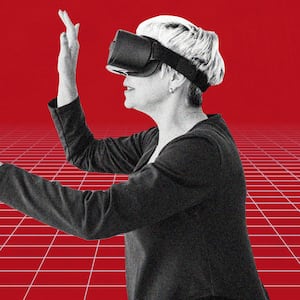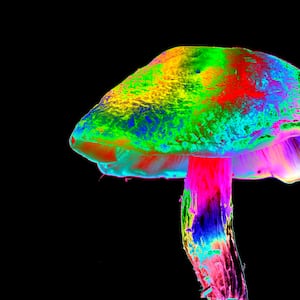Exploring an expansive cave system, growing dozens of seasonal crops, and romancing other farmers and townspeople are just a few of a player’s possible activities in “Stardew Valley,” the popular farming and life simulation video game released in 2016. But when I was scrolling through my Instagram feed recently, I saw an ad for a company attempting to add another item to the list: therapy.
“Meet with a therapist while playing ‘Stardew Valley,’” the advertisement said. As a therapy-going cozy gamer, I felt strangely targeted by the algorithm; apparently, so did many other users who wrote things in the comments like, “The algorithm is getting so specific,” and “I’m feeling called out.”
“The comments are so sweet and so funny, particularly the ‘Stardew Valley’ ones where they’re like, ‘I don’t want my therapist to judge me for marrying Shane,’” Brian Chhor told The Daily Beast. He’s the co-founder and CEO of Hero Journey Club, a mental health support network that uses gaming to facilitate group sessions, and the organization behind the Instagram ad.

One of Hero Journey Club’s ads on social media. Brian Chhor started Hero Journey Club in Feb. 2022 to “take therapy out of the clinic and into the spaces where people already spend time.”
Hero Journey ClubFounded in 2022, Hero Journey Club aims to improve mental health by offering entirely remote, anonymous support groups led by therapists that also take place inside popular video games like Animal Crossing, Minecraft, and Stardew Valley. While its underlying premise of using video games for therapeutic value is by no means new, its model has seemingly never been attempted on such a large scale.
Once a radical idea, incorporating gaming into therapy has gained mainstream acceptance. During the pandemic, for instance, therapists turned to gaming with their clients as a way to forge stronger connections virtually. Experts told The Daily Beast that the goals of video game therapy are like those of any other form of therapy: engaging people who might not otherwise seek out mental health care, building rapport and probing clients’ feelings, and teaching self-awareness and constructive coping mechanisms.
In other words, video game therapy is just leveling up mental health treatment.
What’s In a Game?
In a recent Hero Journey Club session, players met up with a trained, accredited therapist—which the company calls “journey guides”—in the co-operative mode of Stardew Valley. Players roamed around the game’s retro-inspired landscape, farming and exploring the town and surrounding mines. After a productive day of fishing, baking bread, and planting parsnips, the guide put a question to the room: What in-game NPC (nonplayer character) would the journeyers want to date?
A participant named Fate said they’d pick an NPC named Abigail. They’re drawn to how the character defies gender roles and rebels against the expectations set by her mother.
The journey guide deftly turned the statement back to Fate. “What I'm hearing is that you connect to this narrative,” she said. “I’m wondering if you have a similar narrative to Abigail, and that you felt these societal pressures or family pressures to fit into gender roles?”
Using details from a video game to facilitate a conversation is one of the key benefits of this form of therapy, said Josué Cardona, the president of the nonprofit Geek Therapy. Cardona—who is unaffiliated with Hero Journey Club—started Geek Therapy while a counseling intern to promote the mental health benefits of tech, TV shows and movies, and video games—media that’s traditionally been thought to rot your brain, not heal it.

A group session hosted by Hero Journey Club on Minecraft. Experts told The Daily Beast that the goals of video game therapy are like those of any other form of therapy: engaging people who might not otherwise seek out mental health care, building rapport and probing clients’ feelings, and teaching self-awareness and constructive coping mechanisms.
Hero Journey ClubAsking a person to talk about elements of a video game they’ve played can help them see their problems from a different perspective and unlock unexpected feelings, Cardona told The Daily Beast.
“Sometimes we don't even know how to verbalize our emotions,” he explained. “If you're confronted with them in some kind of media, now we have a catalyst for us to actually do the actual therapy.”
Cardona has assigned video games to clients as homework for this purpose, and in some cases, has played one-on-one games in sessions. Despite what you’d think, there’s no “best” kind of game for therapy, he said. Even free-to-play, match-3 games (think Bejeweled, where there’s no storyline and players earn points by lining up three of the same items) have their place as ways to teach clients emotional regulation and start conversations about how they build small distractions into their day.
However, there are experts who believe that some games are better than others for therapeutic purposes. In 2020, Akili Interactive received the go-ahead from the Food and Drug Administration to market their game, EndeavorRx, as a digital therapeutic for childhood ADHD. A study published the year after in NPJ Digital Medicine found that children with ADHD who played the game for eight weeks improved their score on a test measuring impairment, regardless of whether they were also receiving medication for the condition.
“I think there is absolutely a place for explicitly therapeutic games,” Andrew Fishman, a licensed clinical social worker who also plays video games with his clients, told The Daily Beast.
Other platforms that prioritize therapeutic uses include Mightier, which couples puzzles and action games with a heart monitor to improve a child’s calming skills; and Ava, a game created by autism advocates and developers to teach social skills and responses in a stakes-free environment. These games may be easier for therapists to build in moments of reflection and learning sessions—but popular, mainstream games have a place, too.
“I play Call of Duty with clients a lot,” Fishman, who is unaffiliated with Hero Journey Club, said. A good game for therapy is “really any game that people enjoy and can play together.”
Though he spent months of the pandemic leading clients virtually in co-operative games like Quiplash, Fishman said he prefers in-person sessions when gaming. Making sure everyone is engaged and observing players’ body language can be much harder from the other side of a screen.
While the remote, anonymized nature of Hero Journey Club’s platform makes these challenges unavoidable, it unlocks new opportunities to engage people in mental health support from around the world who might not otherwise make it to an in-person session. It sounds promising, but what else sets the company apart from being just another flashy and as-seen-on-Instagram product?
Game On
Chhor, the CEO of Hero Journey Club, said that gaming became a refuge for him during childhood. But it wasn’t until the pandemic that he realized he could share his passion with those who needed it most. A close family member confided in him that he was struggling with suicidal ideation, but at the time, he couldn’t afford the care he needed.
If you or a loved one are struggling with suicidal thoughts, please reach out to the National Suicide Prevention Lifeline by dialing or texting 988.
“So we did what we could—my family actually gamed with him every week to keep him company and keep an eye on him,” Chhor said. Sessions in Stardew Valley, Animal Crossing, Minecraft, and the co-op game It Takes Two became conduits for candid discussions around stress, depression, loneliness, and addiction.
Based on this experience, Chhor started Hero Journey Club in Feb. 2022 to “take therapy out of the clinic and into the spaces where people already spend time,” he explained. Journeyers pay $30 a week for a guided 80-minute group session and access to a private Discord chat.

A Hero Journey Club session on Stardew Valley. Using details from a video game to facilitate a conversation is one of the key benefits of this form of therapy.
Hero Journey ClubAlthough journey guides are licensed and accredited, Hero Journey Club doesn’t technically provide therapy. This distinction means that their service can’t be reimbursed by a person’s insurance, but it could simplify a remote-only model since their therapists might otherwise have to seek licensure in multiple states and jurisdictions, Cardona said. As far as the pricing for an out-of-pocket service goes, Fishman said $30 per session is “about average.”
(“When insurance can’t cover something, you have to charge a lot less because people can’t afford it,” he added.)
Hero Journey Club spins their model in a different way: Requiring that journey guides be accredited and licensed professionals is a way to signal trust and security in their service.
“But the practice of the group itself is very much focused on a community-first sort of model, allowing each journey to participate in a way that doesn't have the same kind of stigma or intimidation that goes into entering an official treatment setting,” Hero Journey Club chief clinical officer Derrick Hull told The Daily Beast.
Though the company’s goal is ambitious, Chhor said they have already seen success: In the first half of this year, the company doubled its user base each month, and 70 percent of journeyers identify as coming from a marginalized community.
The COVID-19 pandemic brought the growing mental health crisis to light. Hull said that like all epidemics, the loneliness epidemic isn’t evenly distributed and affects marginalized communities disproportionately. The makeup of Hero Journey Club’s users is heartening since it means their service is “getting to the people who need it the most.”
“It’s why we go into this profession—to have an impact,” he said. “And so when you see it, it’s very gratifying.”
One example of this impact occurred at the end of the recent Stardew Valley session. Players had largely spent their time off on solitary adventures—leveling up their gear to battle monsters, and catching rare, highly valued fish. Fate had baked hundreds of loaves of bread and stored them in a communal chest.
As the session came to a close, the journey guide asked the players to share one takeaway that made them smile.
“Its definitely nice having people that have gone through similar experiences that can relate to you and that you have as support when you’re talking through difficult things,” said a player named Box Ghost.
That, they said, and “the sheer amount of bread in our chest.”







